Top Ten CompetencyWorksAuthors of 2024
CompetencyWorks Blog
This post looks back on the most-read 2024 CompetencyWorks blog posts by ten different authors. We didn’t count the ever-popular and handy Competency-Based Education Across America, which brings together more than 200 blog posts from CompetencyWorks site visits across the country. We offer our gratitude to the many leaders in the field – including students and teachers – who have generously shared their knowledge, tools, and perspectives to advance K-12 competency-based education (CBE).
Illustrating the Competency-Based Education Definition
by Laurie Gagnon
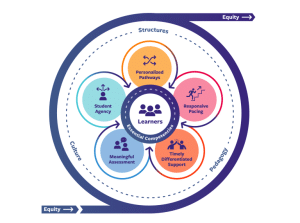
This post unveils the Aurora Institute’s dynamic new graphic representing Aurora’s competency-based education (CBE) definition, crafted with insights and feedback from leading voices in the field. Explore how the seven interconnected CBE elements – designed to drive equity and personalized learning – can transform education. With practical strategies and a fresh visual approach, this post offers an engaging way to deepen understanding and drive meaningful progress in CBE practices.
The Drive Towards Student Agency: Empowering Students to Make Choices on Their Learning Pathway
by Morgan Seely
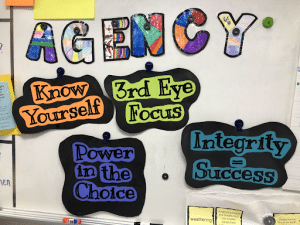 As part of the Future of Learning Collaborative, districts across Wyoming are pioneering student-centered, competency-based education practices. With 43% of K-12 students in pilot districts, Wyoming is making exciting progress toward creating personalized, flexible learning experiences that empower students. It’s an insightful look at the innovative changes reshaping education in Wyoming, such as Weston County School District 7’s efforts to integrate creativity into classrooms and assess creative thinking, in alignment with Wyoming’s Profile of a Graduate.
As part of the Future of Learning Collaborative, districts across Wyoming are pioneering student-centered, competency-based education practices. With 43% of K-12 students in pilot districts, Wyoming is making exciting progress toward creating personalized, flexible learning experiences that empower students. It’s an insightful look at the innovative changes reshaping education in Wyoming, such as Weston County School District 7’s efforts to integrate creativity into classrooms and assess creative thinking, in alignment with Wyoming’s Profile of a Graduate.
The Wyoming Future of Learning Pilot: Student-Centered and Competency-Based
by Amy Starzynski
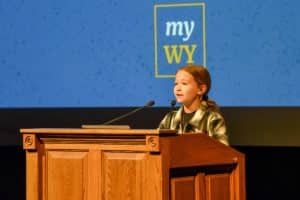
As part of the Future of Learning Collaborative, districts across Wyoming are pioneering student-centered, competency-based education practices. With 43% of K-12 students in pilot districts, Wyoming is making exciting progress toward creating personalized, flexible learning experiences that empower students. It’s an insightful look at the innovative changes reshaping education in Wyoming, such as Weston County School District 7’s efforts to integrate creativity into classrooms and assess creative thinking, in alignment with Wyoming’s Profile of a Graduate.
Making a Portrait of a Graduate Authentic and Dynamic
by Kyle Dunbar, Laura Mandell, Brandi Swavely, Kelly Mills & Anthony Baker
Learn about how Digital Promise and Ephrata Area School District in Pennsylvania joined forces this year to develop integrated learning pathways, meaningful assessment approaches, and powerful teacher professional growth experiences. Drawing upon Ephrata’s Life Ready Graduate Initiative, launched in 2015, and Digital Promise’s Portrait of a Graduate initiative, this post offers practical insights for how to implement a Portrait of a Graduate in authentic, equitable, and sustainable ways.
Mindsets and Resources for Unleashing Learner Agency
by Derek Wenmoth & Marsha Jones
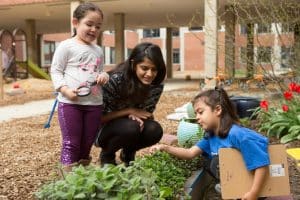
Seven-year-old Michael’s journey to solving a Rubik’s Cube is more than just a story of persistence—it’s a powerful example of self-directed learning. In this post, discover how competency-based education can unlock that same determination in students, empowering them to take control of their own learning. With insights from the Agency by Design playbook, learn how small shifts in the classroom can inspire big changes in student engagement and ownership. Be sure to check out this related post about “The Continuum of Choice.”
Getting Started With Real-World Learning at a Comprehensive High School
by Chiara Wegener
Uxbridge High School is revolutionizing its educational approach by integrating real-world learning into its curriculum. With growing student participation in internships and career pathways, the school empowers students to gain hands-on experience in fields like biomedical science and manufacturing. Discover how Uxbridge’s focus on innovation, community partnerships, and student ownership is reshaping education and preparing students for future success.
Finding My Future: My Big Picture Learning Experience
by Izaiah Jones
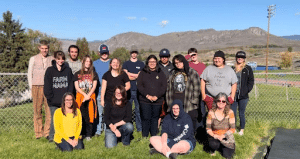
In this personal reflection, Izaiah Jones, a student at Tonasket Choice High School in Washington, shares how the school’s unique approach to learning helped them overcome self-doubt and unlock their creativity. With the freedom to explore his passions for drawing and writing, Izaiah describes how the school’s competency-based system enabled learning at their own pace and finding their purpose. Discover how personalized education can help students thrive without the pressure of traditional grades.
There’s A Google Doc For That! One School’s Journey Creating a Comprehensive “Mastery Handbook”
by Greg Zimdahl
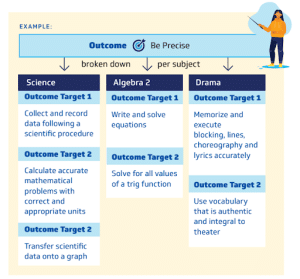 Follow The Young Women’s Leadership School (TYWLS) of Astoria’s journey of creating a Teacher Mastery Handbook to support competency-based education (CBE). From spirited debates to “thousands of Google Docs,” their grassroots efforts evolved into a comprehensive guide for mastery-based learning. The handbook bridges theory and practice, equipping teachers with tools to craft curriculum, assess outcomes, and foster authentic growth. Explore how TYWLS’s dedication to continuous improvement drives their innovative approach to education.
Follow The Young Women’s Leadership School (TYWLS) of Astoria’s journey of creating a Teacher Mastery Handbook to support competency-based education (CBE). From spirited debates to “thousands of Google Docs,” their grassroots efforts evolved into a comprehensive guide for mastery-based learning. The handbook bridges theory and practice, equipping teachers with tools to craft curriculum, assess outcomes, and foster authentic growth. Explore how TYWLS’s dedication to continuous improvement drives their innovative approach to education.
Using the CBL School Design Rubric to Refine and Deepen Work in one New Hampshire School District
by Jennifer Mathieu, Brian M. Stack, Jonathan G. Vander Els
In 2018, Vander Els and Stack introduced a school design rubric rooted in the Aurora Institute’s seven principles of competency-based education. SAU 7, a rural district in New Hampshire, embraced the rubric in 2020 to enhance collaboration, align curriculum, and refine assessments. Through dedicated teamwork and professional development, they’ve made significant strides in building a unified, student-focused education system. Explore their journey of transformation.
Voices of Indigenous Educators Series: “We’re all in this canoe together.”
by Sui-Lan Hoʻokano
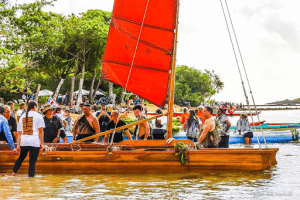
In this conversation-based post, Sui-Lan Hoʻokano reflects on her experience as she weaves the wisdom of ancestral canoe teachings with modern education, inviting us to rethink individualism and embrace collective growth rooted in reciprocity and connection to the land. She connects student-centered practices to their origins in indigenous practices, for example, she notes, “you need to get out of the brick-and-mortar and get outside and create these experiences for learning to stick. They call it experiential learning. I call it ʻIke Kūpuna. This is the transfer of knowledge that we’ve had since time immemorial.”
Rethinking Learning Through Educator Micro-Credentials
by Michaela McCaughey
Amid the pandemic, teacher Michaela McCaughey used the ExcEL micro-credential program to transform her approach to education. By focusing on family engagement, school culture, and multilingual student support, she created impactful projects like a student mentorship program for newcomers. Her experience reshaped her teaching, emphasizing holistic, inclusive learning that connects students’ full selves—languages, cultures, and families—into the educational process.